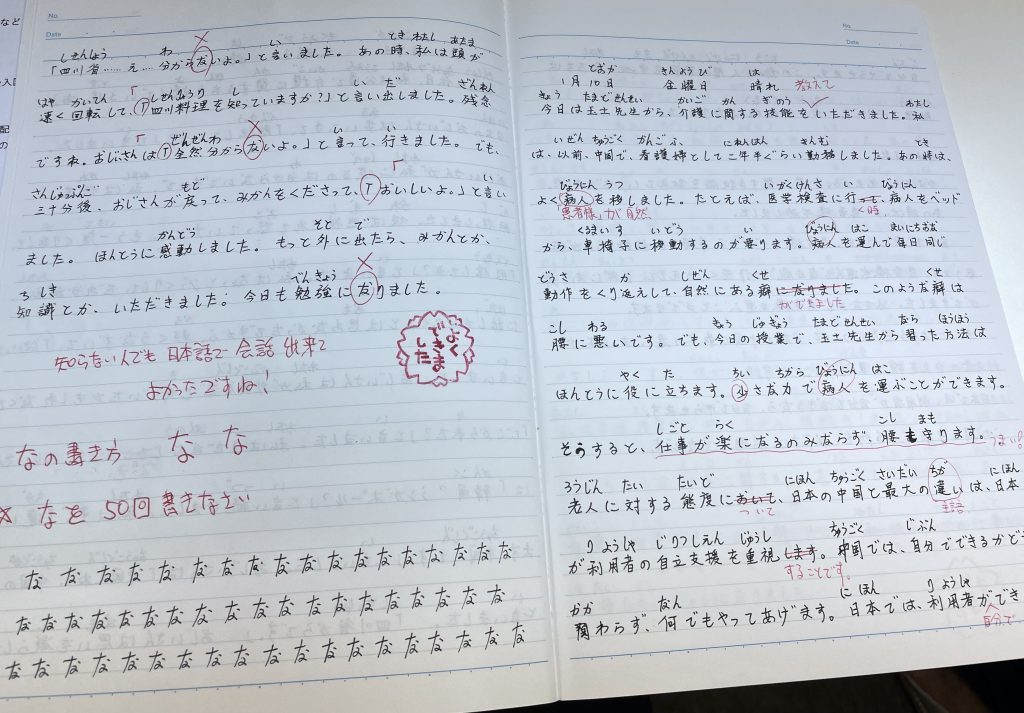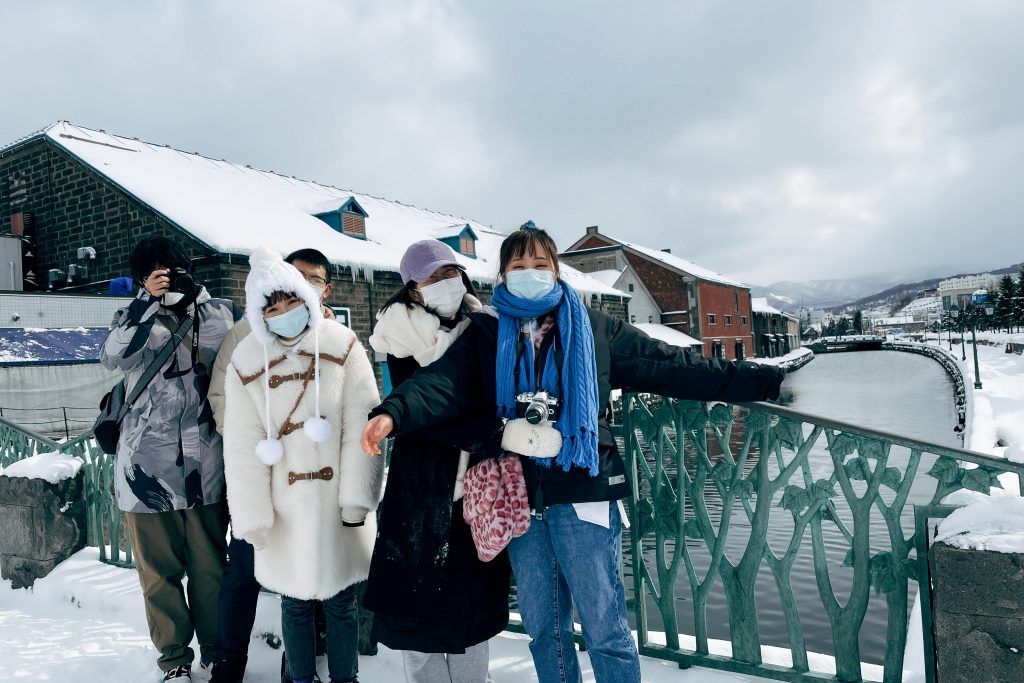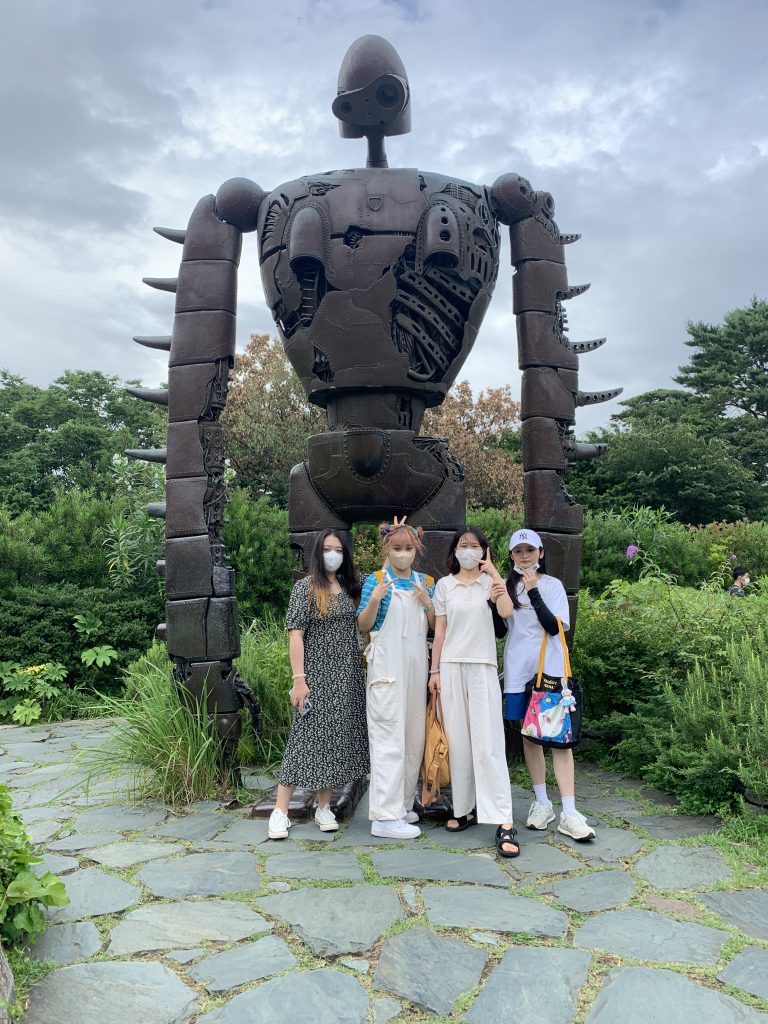October 2022
Dispatches From the Field with Foreign Workers
Supervising Organization: PNJ Business Cooperative, Implementing Organization: Seitokukai Social Welfare Corporation
This article is excerpted and partially re-edited from an article published in JITCO’s general information journal Kakehashi and submitted by JITCO’s Public Relations Group.
Technical intern trainees from the PNJ Business Cooperative in Arakawa-ku, Tokyo, won one First Prize and one Second Prize each in the 30th JITCO Japanese Essay Contest. So far, the Cooperative has produced a cumulative total of five First Prize winners, and more than 50 of its trainees have been selected, including Second Prize winners. What is it doing to achieve such results?
-

- From back left, Representative Director Mr. Yamauchi, Executive Director Ms. Minami, and Supervising Director Mr. Abe
-

- A technical intern trainee’s journal corrected by Supervising Director Abe
PNJ Business Cooperative used to accept many trainees in the sewing industry, but now it accepts more than 100 care worker trainees. Unlike the sewing industry, where the emphasis is on technical skills, the care worker industry places importance on Japanese language skills and personality, according to Representative Director, Mr. Yamauchi. Technical intern trainees are selected from among candidates who have achieved N4 or so on the Japanese-Language Proficiency Test, and it takes them three to six months after that to acquire N3 by the time they enter Japan. Although it may seem that the time required to learn Japanese is short since the candidates are from China, the time spent in the preliminary training naturally weeds out those candidates who just want to come to Japan to earn money, leaving only those who are serious and have a firm goal in mind. The sending organization has the perception that “PNJ has a strict selection and preparation process, but once trainees are in Japan, they take good care of them and introduce them to even better training sites,” so it puts together a good pool of candidates. Candidates for care workers are mainly recruited at nursing colleges in China.
PNJ’s technical intern trainees are required to write a daily journal from the day they arrive in Japan. The journals are carefully corrected by Supervising Director, Mr. Abe, who gives them guidance on Japanese handwriting practice and natural phrasing, and provides constructive comments. This daily effort seems to have led to the trainees’ success winning awards in the JITCO essay contest. If the trainees have any other problems or concerns, Executive Director, Ms. Minami responds immediately upon being contacted. When trainees are feeling down, she encourages them by saying, “You are a PNJ trainee, you can do it!” The Cooperative also holds New Year’s and birthday parties, and at summer festivals, it lends out some 40 yukata that it owns to trainees and teaches them Bon odori dancing and singing. Based on the relationship of trust built by the Cooperative staff, the technical intern trainees leave PNJ, their “family home,” for their respective training sites. In fact, many trainees actually return to this “family home” from their training sites during the year-end and New Year holidays, which also shows the good relationship between the supervising organization and the trainees.
PNJ trainees not only win prizes in the JITCO Japanese Essay Contest almost every time, but also obtain N2 and N1 on the Japanese-Language Proficiency Test during their training period, and care worker trainees study on their own while training and pass the exams for nurses, assistant nurses, and care workers. Mr. Yamauchi says that seeing these results has made the program more rewarding than he had originally expected. The intense month spent with staff and fellow trainees during the training course at PNJ after entering Japan seems to provide a good impetus or awareness for the trainees, enabling them to continue their training and studies with a goal in mind even after being assigned to a training site.
Due in part to the recent depreciation of the yen, it has become difficult to attract prospective trainees, especially in China. In fact, while entry to Japan was restricted due to the COVID-19 pandemic, more than half of PNJ’s candidates withdrew. When we asked Mr. Yamauchi about the Cooperative’s future prospects, he replied that there is already overdemand for PNJ’s technical intern trainees, and that although contracts with some potential accepting organizations have been turned down, PNJ will continue to train a select few who will be of service in the nursing and medical fields in both countries.
-

- Photo provided by PNJ technical intern trainees Heyin & Fulian, who were interviewed for Kakehashi (in Hokkaido)
-

- Same as left (at the Ghibli Museum in Mitaka)
◆The full text of the Kakehashi article, including the interview with the Implementing Organization and technical intern trainees, is available in the October issue of Kakehashi (top page of the general information journal Kakehashi).


